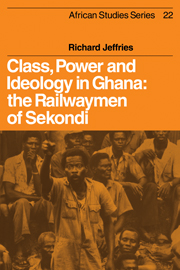Book contents
- Frontmatter
- Contents
- List of maps and tables
- Acknowledgements
- Introduction
- Part I A political history of Ghanaian railway unionism
- 1 The railway and harbour workers of Sekondi-Takoradi: a sociological profile
- 2 The origins and dynamics of Railway Union development
- 3 The railway workers in the nationalist movement – the meaning of political commitment
- 4 The politics of TUC reorganisation under the CPP regime
- 5 The railway workers' response to CPP socialism: the strike of 1961
- 6 The development of an independent and democratic trade union movement
- 7 The railway workers divided: the sources and structure of political conflict in the Railway Union
- Part II Class, power and ideology
- Conclusion
- Appendix: Survey questionnaire administered to a sample of railway workers at Sekondi Location
- Notes
- Bibliography of sources cited
- Index
4 - The politics of TUC reorganisation under the CPP regime
Published online by Cambridge University Press: 30 September 2009
- Frontmatter
- Contents
- List of maps and tables
- Acknowledgements
- Introduction
- Part I A political history of Ghanaian railway unionism
- 1 The railway and harbour workers of Sekondi-Takoradi: a sociological profile
- 2 The origins and dynamics of Railway Union development
- 3 The railway workers in the nationalist movement – the meaning of political commitment
- 4 The politics of TUC reorganisation under the CPP regime
- 5 The railway workers' response to CPP socialism: the strike of 1961
- 6 The development of an independent and democratic trade union movement
- 7 The railway workers divided: the sources and structure of political conflict in the Railway Union
- Part II Class, power and ideology
- Conclusion
- Appendix: Survey questionnaire administered to a sample of railway workers at Sekondi Location
- Notes
- Bibliography of sources cited
- Index
Summary
The repercussions of the ‘Positive Action’ strike of January 1950 virtually destroyed the Gold Coast TUC and many of its constituent unions. Particularly affected were those unions which had participated in the strike under the radical leadership of Pobee Biney and Anthony Woode. The Mineworkers' Union and the United Africa Company Employees' Union, having remained aloof, were less seriously disturbed and the Colonial Labour Department decided to encourage the resuscitation of the TUC around these moderate, apolitical unions, with affiliation to the International Confederation of Free Trade Unions (the Western liberal trade union centre). The new headquarters were to be based in Accra rather than in troublesome Sekondi. A new constitution prohibited Congress from initiating general strike actions, and allowed the Labour Department supervisory powers over the use of Congress funds. In July 1950, J. H. Sam, the Mineworkers' Union president, became president of the resuscitated Gold Coast TUC, and Charles Techie-Menson, former president and leader of the moderates in 1945–8, now stood in as general secretary.
At the same time, the Convention People's Party, under the direction of Komla Gbedemah during Kwame Nkrumah's detention, turned its attention to the Mineworkers' Union for the purpose of ‘capturing’ it and ensuring its participation in ‘Positive Action no. 2’. For, in 1950–1, Gbedemah and Nkrumah had little reason to think that the apparent failure of the ‘Positive Action’ strike would soon become a glorious victory for them.
- Type
- Chapter
- Information
- Class, Power and Ideology in GhanaThe Railwaymen of Sekondi, pp. 58 - 70Publisher: Cambridge University PressPrint publication year: 1978



